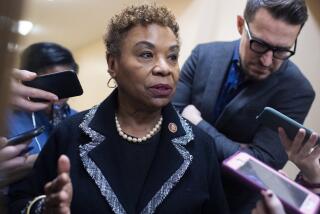Rep. Edward Boland, 90; Opposed Aid to Contras
- Share via
Edward P. Boland, the former Massachusetts congressman who sponsored legislation to curb Reagan administration aid for rebels opposing Nicaragua’s Marxist-led government, has died. He was 90.
The low-key Boland, who never lost an election and served in Congress for 36 years, died Sunday in Mercy Medical Center in his native Springfield, Mass. He had been hospitalized since Oct. 11 with a fractured hip and died of cardiovascular complications.
First passed in 1982, the Boland amendments initially barred military aid to the Contras by the Pentagon or the CIA “for the purpose of overthrowing the government of Nicaragua or provoking a military exchange between Nicaragua and Honduras.” A second version in 1983 capped financial aid at $24 million. A third version, which ended in 1986 as aid resumed, banned all funds for military operations in Nicaragua.
“I don’t like confrontation,” Boland told the Boston Globe in 1983, “but I don’t think our government ought to be involved in the process of overthrowing . . . or destabilizing governments.”
To sidestep the Boland amendment restrictions, the Reagan administration secretly sold arms to Iran and used some of the profits to fund the Contras’ effort to overthrow the Sandinista regime then governing Nicaragua. This activity led to the Iran-Contra scandal.
Boland, who chaired the House Intelligence Committee from its creation in 1977 until 1985, later served on the House Select Committee to Investigate Covert Arms Transactions with Iran. The committee, along with a similar group from the Senate, conducted nationally televised hearings on the affair in 1987.
The scandal led to the indictment of ex-Marine Lt. Col. Oliver L. North and others for violation of the Boland amendments.
Came to Congress With Speaker ‘Tip’ O’Neill
Boland, who so shunned publicity he asked colleagues if somebody else’s name could be applied to his most famous legislation, was asked to take on the sensitive Intelligence chairmanship by the man he accompanied to Washington in 1953 when they were freshmen congressmen--House Speaker Thomas P. “Tip” O’Neill Jr.
“When Speaker O’Neill needed a person of unquestioned integrity who commanded the respect of all members to lead the House’s first attempt at intelligence oversight, he turned to his friend Eddie Boland,” House Democratic leader Richard A. Gephardt said Monday in expressing sadness over Boland’s death. “In a very short time the leaders of the intelligence agencies . . . came to hold him in similar high regard.”
Gephardt said that he admired Boland for his “skill and knowledge” and that “he fought for a principled foreign policy and presided over Iran-Contra hearings in a fair, reasonable manner.”
Boland also rose to be vice chairman of the House Appropriations Committee and chaired its independent agencies subcommittee.
For 24 years--from their arrival on Capitol Hill until O’Neill became speaker in 1977--Boland and O’Neill shared a workweek apartment in Washington, returning on weekends to their Massachusetts districts. They called themselves the “odd couple,” with the neat, trim, reserved and tidy Boland as the Felix Unger of the pair who did the laundry and kept the place clean.
Boland always said the two never had an argument--and never shared a meal in the bachelor quarters. O’Neill said Boland brought his coffeepot to Washington but that their refrigerator held nothing more than orange juice, diet soda, beer and cigars.
Until he left Congress in his mid-70s, Boland was a regular at the House gymnasium, pumping iron daily at 6 a.m. He chaired the gym committee and made sure there was proper workout equipment.
Son of Irish Immigrant First Elected at Age 23
Edward Patrick Boland, the son of an Irish immigrant railroad worker, grew up in Springfield’s “Hungry Hill” working-class neighborhood. He attended the Bay Path Institute business school there and then Boston College Law School.
As a playground director for Springfield, he organized a sandlot baseball league. The players became his campaign workers when he decided to run for election to the state House of Representatives in 1934. He was elected, and he was only 23.
He served six years in the state Legislature, meeting O’Neill when the future speaker was elected during that period, and then won election as Hampden County register of deeds.
In 1942, Boland joined the Army as a private and spent much of World War II in the Pacific theater, rising to the rank of captain.
After the war, he returned to his job as register of deeds, winning reelection. When a congressional seat opened up in 1952, Boland went to Washington.
He was a staunch ally of the Kennedy political dynasty in Massachusetts, serving as John F. Kennedy’s presidential campaign manager for Ohio in 1960 and nominating Edward M. Kennedy for his first try for the Senate at the 1962 Massachusetts Democratic Convention.
A lifelong supporter of civil rights and liberal causes, Boland marched with Martin Luther King Jr. in the landmark civil rights protest in Selma, Ala., in 1965.
Respected by colleagues for his intellect, fairness and quiet but thorough work habits, Boland was unlike most politicians. He kept up his constituent contacts, but in 36 years granted few interviews, mailed only two newsletters and held a single news conference--that was in 1988 to announce he would not seek election to a 19th term.
In 1973, when he was 62, Boland married for the first time--Mary K. Egan, then president of the Springfield City Council and 30 years his junior. They had four children. He decided to retire from Congress, he said at his only news conference, to spend more time with them.
More to Read
Sign up for Essential California
The most important California stories and recommendations in your inbox every morning.
You may occasionally receive promotional content from the Los Angeles Times.













